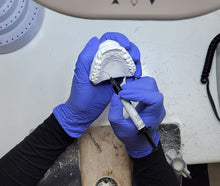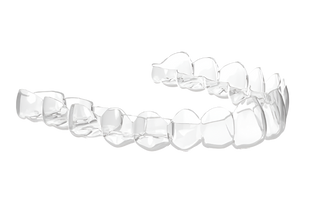If you’re reading this article, you’re probably wondering if you should be adding “get a new night guard” to your to-do list, or if yours is still good to go. Your night guard takes on the full force of your jaw muscles night after night - so even the most durable night guard will need to be replaced eventually! Beyond the damage a night guard sustains, there are a few other reasons why it might be time to trade in your old mouthguard for a shiny new one. Read on to find out more.
There are significant cracks
One of the telltale signs that your night guard needs to be replaced is significant cracking. But just because it’s showing wear doesn’t necessarily mean it’s time for your night guard to throw in the towel!
It’s completely normal and expected for mouthguards to show wear and even to develop some small cracks. In fact, this is a sign that it’s doing its job because it’s taking on the damage that would otherwise be happening to your teeth.
So how do you tell the difference between normal wear versus damage that warrants a replacement?
If your night guard is developing holes or cracks that go completely through the material, it’s time to get a new one. One rule of thumb is if you’re able to see “through” the crack, it is likely going to be impacting the effectiveness of the guard.
Otherwise, if there are areas with scuffs, scratches, or minor cracks that have not yet gone through the guard, your night guard should still be doing it’s job to protect your teeth.
The fit no longer feels right or feels loose
Just like a good pair of shoes, night guards can start to loosen over long periods of use.
If your night guard feels like it’s starting to loosen to the point that it no longer feels right or it feels like the guard is easily falling off of your teeth, it might be time to get a new one.
A night guard that’s too loose could be problematic when you’re grinding or clenching on it and may affect your bite.
You suspect your teeth have changed
Did you know that your teeth are naturally shifting constantly ever so slightly? These movements are often so subtle that it’s hard to notice the change!
There are several different reasons why your teeth might be shifting. Firstly, as we age the front teeth may start to shift forward naturally.
Another reason for tooth movement can include teeth attempting to move back to their original position after orthodontic procedures or shifting back in place after tooth removal.
Everyday activities like the pressure of your tongue on your teeth while eating or talking can also cause minor movement over time.
Lastly, teeth grinding itself can also be a cause of tooth movement.
If you suspect that your teeth have changed or shifted and it’s causing a less than ideal fit for your night guard, you may want to consider getting a new one.
Some night guards can even do double duty by both protecting your teeth from grinding, and keeping them from shifting.
You’ve had dental work done
If you’re going to have dental work done that changes the size, shape, or orientation of your teeth, you’ll very likely need a new night guard once the work is completed.
Some examples might include crowns, tooth removal, veneers, dental implants, or starting braces or aligners. Very minor procedures like fillings shouldn’t affect your teeth significantly, unless it’s changed the size or shape of your tooth.
In order for your night guard to be as effective as possible, you’ll want it to be custom fitted to your teeth post-dental work.
Do the sniff test
Let’s be real, your night guard lives in your mouth for quite a good chunk of the night (or day).
Natural bacteria and calcium in your saliva can cause minor odors or discoloration, especially if you don’t regularly rinse and keep it fresh. You can extend the life of your night guard by following a simple cleaning routine and using fizzy cleaning tablets.
However, if your night guard is becoming significantly discolored or if it simply smells questionable, it may be time to opt for a fresh, shiny new night guard.
Conclusion
All good things must come to an end eventually, including your night guard. Significant cracks, loosening of your guard, changes to your teeth, or excess build up of bacteria could all be reasons to bid your night guard adieu. If you feel like it’s time for a new night guard, we’re here for you with a personalized recommendation for the best one for you.








